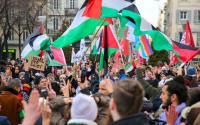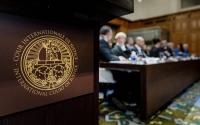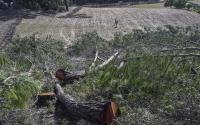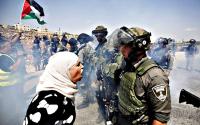'Far better to have a Mubarak or King Fahd than let Muslims vote for a real government that might oppose US policies'
Independent, 26 October 2001
Armoured warfare schools, signals headquarters, artillery ranges, military museums, cavalry lines, infantry battalion compounds... every few hundred yards in every city, you come across them. Driving around Pakistan is like touring a barracks.
Cross the Indus river at Attock and the thump of shellfire changes the air pressure as General Pervez Musharraf's tanks move down the range. Along the roadsides are artillery pieces dating back to the Raj, 45-pounders and French armour and old Sherman tanks on concrete plinths to remind Pakistanis of their heroic martial past.
Their national defence journal carries stirring tales by former chiefs of staff and extracts from the 1962 war diaries of the East Pakistan Rifles. And this is supposed to be a nation threatened with Islamic revolution?
It's an odd phenomenon, but there are times when the West seems to be more worried about the "Islamisation'' of Pakistan than Pakistanis are themselves. For has a military dictatorship ever been more blessed than that of General Musharraf? General Zia-ul-Haq was held in contempt by the West when he hanged prime minister Bhutto – but he was elevated to ally and friend the moment that we needed his help in the anti-Soviet war in Afghanistan. However, by 1993 Pakistan was almost declared a "state sponsor of terrorism'' by the United States because of its support for Kashmiri Muslim guerrillas.
When President Clinton arrived in the subcontinent last year, he paid a state visit to India but gave General Musharraf – who had still to declare himself president – only a few hours, favouring Pakistan with a one-day return trip, a lecture on the evils of Osama bin Laden and an appeal to General Musharraf not to hang the prime minister, Nawaz Sharif.
Nor can General Musharraf have been too pleased with Colin Powell's ode to liberty last January. "There should be no question in any world leader's mind that the most essential ingredient for success in this 21st century is a free people and a government that derives its right to govern from the consent of such people,'' the US Secretary of State announced: "...America stands ready to help any country that wishes to join the democratic world.''
Then came 11 September and General Powell produced a new song sheet. "President Bush,'' he told us on 16 October, "asked me... to demonstrate our enduring commitment to our relationship with Pakistan... we are also looking forward to strengthening our co-operation on a full range of bilateral and regional issues... we're truly at the beginning of a strengthened relationship, a relationship that will grow and thrive in the months and years ahead.'' All of which just goes to show what the loan of a few air bases and the arrest of a few government-sponsored Islamists can do. General Musharraf had taken "bold and courageous action" against "international terrorism".
And in the blinking of an eye, there was General Powell promising to take up the Kashmir dispute with India – the very nation that almost persuaded America's State Department to put Pakistan on its "terrorism" list in 1992. Newsweek outlined the US government's view with alarming, if unconscious, frankness. "It may be a good thing that Pakistan is ruled by a friendly military dictator,'' the magazine concluded, "rather than what could well be a hostile democracy.''
This, of course, is the very policy that dictates Washington's relations with the Arab world. Far better to have a Mubarak or a King Abdullah or a King Fahd running the show than to let the Arabs vote for a real government that might oppose US policies in the region.
Corrupt, lawless, drug-ridden, and inherently unstable Pakistan may be, but General Musharraf allows a kind of freedom of speech to continue. Anyone used to the arid wastes of Arab journalism can only be surprised by the debate in the Pakistani press, the often violent anti-Musharraf views expressed in the letters pages and the columnists who argue forcefully for a return to democracy. If General Musharraf has to allow Islamists their freedom to "let off steam'' – as Pakistanis like to say – then he has to give equal space to the democrats.
Aqil Shah put it very well when he wrote in Lahore's Friday Times last week that, by allying himself with America's "War on Terror'', General Musharraf had secured de facto international acceptance for his 1999 coup. Suddenly, all he had wished for – the lifting of sanctions, massive funding for Pakistan's crumbling industry, IMF loans, a $375m (£263m) debt rescheduling and humanitarian aid – has been given him.
While General Powell mutters a few words about political freedom – and none at all about Pakistan's nuclear tests – we hear no more of General Musharraf's widely publicised "roadmap'' to democracy.
The problem, as Mr Shah points out, is that future peace and stability requires sustained investment in solid secular democracies – not in stable dictatorships. Yet the United States is now laying the foundations of a long-term autocracy in Pakistan, a dictatorship not unlike those that lie like a cancer across the Middle East.
The United States likes to call this a "strategic engagement'' and is already, in its embassy's private press briefings, reminding journalists of the corruption that smeared the democratically elected Sharif government. Far better, surely, to have an honest, down-to-earth, clean military man in charge.
Of course, we must forget that it was Pakistan's Interservices Intelligence (ISI) outfits – the highest ranks of the country's security agencies – that set up the Taliban, funnelled weapons into Afghanistan and grew rich on the narcotics trade. Ever since the Soviet invasion of Afghanistan in 1979, the ISI has worked alongside the CIA, funding the mullahs and maulawis now condemned as the architects of "world terror''.
Most Pakistanis now realise that the ISI – sanctioned by Washington rather than Pakistan's own rulers – turned into a well-armed and dangerous mafia, and while money was poured into its smuggling activities, Pakistan's people lacked education, security and a health service. No wonder they turned to Islam and the madrassa schools for food and teaching.
But will anything really change? Pakistan's military is now more important than ever, an iron hand to maintain order within the state while its superpower ally bombs the ruins of Afghanistan. Driving past all those compounds and cavalry lines and barrack squares in Pakistan, one can only be shocked by the profound social division they represent.
Outside in the street, Afghan refugees and Pakistan's urban poor root through garbage tips and crowd on to soot-pumping buses to work in sweatshops and brick factories. Inside, behind the ancient, newly painted cannons and battalion flags, rose bushes surround well-tended lawns and officers' messes decorated with polished brass fittings.
No rubbish litters this perfect world of discipline. Why should anyone living here want a return to corrupt democracy? Especially when America is their friend.






